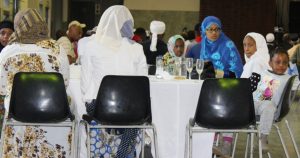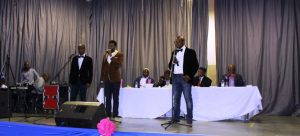Nabeela Vadwalla | 19 May 2016
The Soweto Muslim Shura Council (SMSC) hosted their second annual function at the Protea South Hall to honour luminaries that have contributed to the growth of Islam in the Soweto Community.
The programme on 7 May 2016 highlighted those persons that were instrumental in the growth and maintenance of the Soweto Masjid, commonly known as the Dlamini Masjid.
Al Hajj Amir Zaid Langa, who is the Ameer (leader) of the SMSC welcomed guests and explained the purpose of the day. Sheikh Langa conveyed the rich history of Muslims in Soweto but lamented the fact that it has not been recorded and archived for the benefit of coming generations.
He announced that the function was hosted because, “we wanted to record our history and honour those who have played a role in developing Islam in our township [Soweto].”
Present at the gathering was the Ameer of Gauteng Muslim Shura Counci,l Mohammed Gadimang, Gauteng MEC for Transport, Ismail Vadi, along with various well-wishers and and Ulama (Muslim scholars).
MEC Vadi noted the importance of honouring the elderly in their lifetime and remembering the good they have done long after they have left the world. He revealed that, “these elderly persons who are on stage today are pioneers of the community and pioneers of the black Muslims in South Africa.”
The founding members of the Soweto Muslim Association which was established in 1978 included; Sayed Ali Zhange, Adam Ali Koko, Walid Ndebele, Muhammed Ali Mvelani, Faizel Morris, Babu Magudielo, Babu Chauke and Haroon Mbombi.
Abdul Malik Ndebele, one of the three surviving members, of the original Soweto Muslim Association, with Sayed Ali Zhange and Muhammed Ali Mvelane being the remainder two, told attendees of their journey to accepting Islam and their involvements in the Soweto Muslim community.
Ndebele spoke first, and retold his tale into the fold of Islam when he was a young man. He befriended a professional Muslim boxer who first introduced him to the religion. Ndebele remembers that at the time “my belief was that Islam was just an Indian religion”. He further accompanied his friend to the Newtown Masjid (mosque), where he became a student, of Khalid Hassen, who taught him about Islam.
Sayed Ali Zhange also addressed the crowd about his acceptance into Islam. Zhange explained that he saw a man in the masjid put his forehead onto the ground, his curiosity got the better of him, which lead him to question his Muslim friend about this. It was later on that day that a young Zhange was certain about Islam, and he accepted the religion immediately.
He took to the streets of Soweto to spread the message of Islam. On realising the difficulty of doing dawah alone, he met a Christian girl who became Muslim before they married. Together they had a daughter. Where there was just one Muslim in Soweto, there were now three.
In 1973 Zhange completed his Hajj. When he travelled to Mombasa, he reminisces that, “I saw that Islam is not an Indian religion, it is a religion of mankind.” Describing to the audience that there were black Muslims who attended prayer in Masaajid (mosques) found at every corner and there were black women who wore niqab (the veil) freely, whereas, his wife in Soweto was the only one who covered.
On returning to South Africa, he started the first madressa (Islamic school) in Soweto. He explained that, “the first madressa was a very difficult thing, there were only 4 or 5 children… Then the children became 11… we had to move the madressa… until the children were 35 in number.” He taught the children in Arabic and Zulu; so that when the children went home, they could teach their parents and make their parents understand Islam.
Zhange informed the crowd about the conception of the first Muslim organisation in Soweto, which was spurred on by the growing number of people accepting Islam and the Muslims residing in the area. “The Soweto Muslim Association was formed in Cape Town in 1978… We drafted the constitution with help from certain brothers in Lenasia. The constitution was finalised and adopted… And we felt a masjid must be established in Soweto”, explained Zhange.
Zhange’s friend, Mr Hoffman, an Afrikaaner, advised them on a masjid site. They applied for it but encountered some difficulty when the mayor at the time thought that this would encourage Indians to come to the Soweto Township in an Apartheid South Africa.
However, not long after, their application was accepted, on terms that the lease be renewed each year. The building of the masjid proved slow due to of the lack of funds. The money was raised through a donor from Madeenah, Saudi Arabia, members of the Lenasia community, and through donations of various masaajid in Gauteng. The masjid was then completed and by 1991 there were already 200 children attending the madressa.
Dawood Ndebele, the son of Abdul Malik Ndebele, who was one of the organisers of the event, commented: “We need to show appreciation to those who started the first madressa and masjid in Soweto. We had this event to capture the history of Muslims in Soweto which is very important for the community to remember and realise. History from the mouths of those who started it. Last year we honoured Hafez Adam, Babu Chauke and Babu Magudielo. This year we honoured the members who founded the Soweto Muslim Association.”
The Soweto Shura have been urging the Soweto and Lenasia communities to continue dawah and to maintain the Islamic institutions in Soweto. Those who had founded it with much struggle, have either passed on, or are now old. They urge the younger generation to remember the struggles and continue forward .
“As the youth wing we feel the elders have done their best and now is our time to move it further for the next generation,” said Gauteng Muslim Shura Council Youth (GMSCY) leader, Abduraheem Nkomane.
Ponty Moletsane from Salaamedia who attended the event, added. “Salaamedia has recognised that covering the various sectors of the community, including those who were historically and are currently marginalised. We want these voices to be heard. It is through the hard work of the pioneers of Islam in Soweto that we witness the growth of Islam within the African indigenous communities.”


